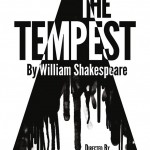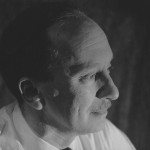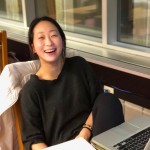Emily Kennedy, a junior from Portland, Oregon, wasn’t planning on being a stage manager this semester. She had already stage managed three shows at Swarthmore thus far, and as a Political Science Major with Environmental Studies and Math minors who is also pre-med and going abroad next semester, she had plenty of reason to take a break this spring and focus on academics and other extracurricular pursuits.
But when senior honors Theater major Wesley Han asked her to run their upcoming production of The Tempest, she found herself unable to turn down the “crazy” opportunity. Kennedy knew Han from previous plays, in which at least one of them was acting, and had also seen their work as the director of last fall’s Senior Company production of HIR. She describes Han as “such an incredible artist” and the chance to work with them as a stage-manager/director team on a show this ambitious she felt was not one to be missed.
A major part of what sets Han’s Tempest apart from Swarthmore’s usual theater offerings is that dance and music play an integral role throughout. This makes sense considering their background as a cellist and pianist, whose drama experience during high school consisted almost exclusively of acting, singing, and dancing in musicals. It’s true that here at Swarthmore, Han “got used to doing straight theater” and even learned to appreciate “how much more room for substance there is when you’re not stopping every five minutes to spontaneously burst into song.” But after a very substantial and emotionally charged directing capstone last semester in the form of HIR, which involved just four actors and explored family politics with a queer twist, Han is returning to a much more dance- and sound-oriented production this spring with The Tempest.
The whole idea of doing this show originated in large part in the desire to incorporate dance into Han’s theater work, and Shakespeare provided a natural starting point. “So much of [a Shakespeare story] needs to be told nonverbally,” Han says, since “a lot of the language isn’t accessible today.” And when dance minor Jenny Gao ’18 planted the seed of potentially collaborating, they immediately thought that her background and movement style would make her a good fit for the role of Ariel in The Tempest; in this production, Ariel isn’t just “some dude in a costume covered in feathers who just moves around like a person,” but rather a fully embodied spirit, with a cadre of lesser spirits to do her bidding.
In charge of choreographing most of the movement for that spirit ensemble is Louisa Carman ’21. Carman, a prospective Political Science major with minors in Spanish and Dance, brings to this project a wealth of dance experience applied in new ways. In high school, she studied ballet, jazz, tap, and hip-hop, and performed with Chicago’s Evanston Dance Ensemble in several of their large story-based productions, such as The Lion, the Witch and the Wardrobe and Alice in Wonderland. Through Evanston, she also gained some experience creating her own work, but hadn’t yet combined the two skills—choreographing and storytelling—in a deliberate way until The Tempest. This combination proved initially difficult, as Carman says “it was a challenge for me to choreograph with the mindset that every element…has a role in advancing the story and adding to the overall atmosphere of the scene.” She has had throughout the process to balance the worth of her movement for its own sake with how well it contributes to the overall theatrical production.
Sound designer Oliver Lipton ’18 has found himself adjusting to that balance, as well. Lipton composed most of the show’s soundtrack as an honors thesis for his major in Theater, and while he had previously produced a radioplay called What We Fear as an independent study, this is his first experience creating sound for live theater or dance. There’s a lot to explore, as not only is he providing the precise cues referred to or suggested by the script, but also the more extensive and rhythmically structured music for dance. Since Ariel in this production doesn’t speak onstage, he’s also responsible for manipulating recordings of Ariel’s voice to stand in for live lines. All of these have to fit into a coherent soundscape that suggests the particular atmosphere and dynamics of one island, which Lipton decided was a mix of electronic and acoustic sound (dancer Gabriela Brown and Han play flute and cello, respectively, in several of his compositions). He says that within that general auditory framework, “designing sounds in such a way that they work for the rest of the elements at play has been very interesting.”
Despite the challenges and compromises inherent in crafting all the factors involved in a production of this scope into a harmonious whole, having so many minds in the mix is ultimately quite rewarding. Carman, for one, says her favorite part of choreographing for the show has been “working with other creative people,” and that she has “learned so much about the decisions that happen behind the scenes for a production like this one.” Stage manager Kennedy, who gets to follow the whole arc of the project from before auditions to closing night, definitely agrees. She loves facilitating and watching as “a bunch of people come together to make something cool.” And The Tempest is shaping up to be something cool, indeed.
The Tempest will be showing in the LPAC Frear Ensemble Theater Friday, March 30th at 8pm, Saturday, March 31st at 2pm and 8pm, and Sunday, April 1st at 2pm.
Lydia Roe ’20













